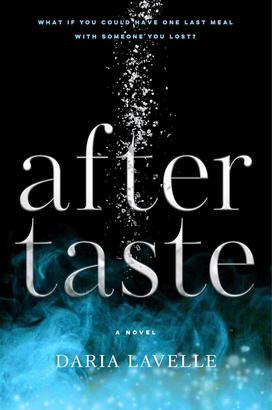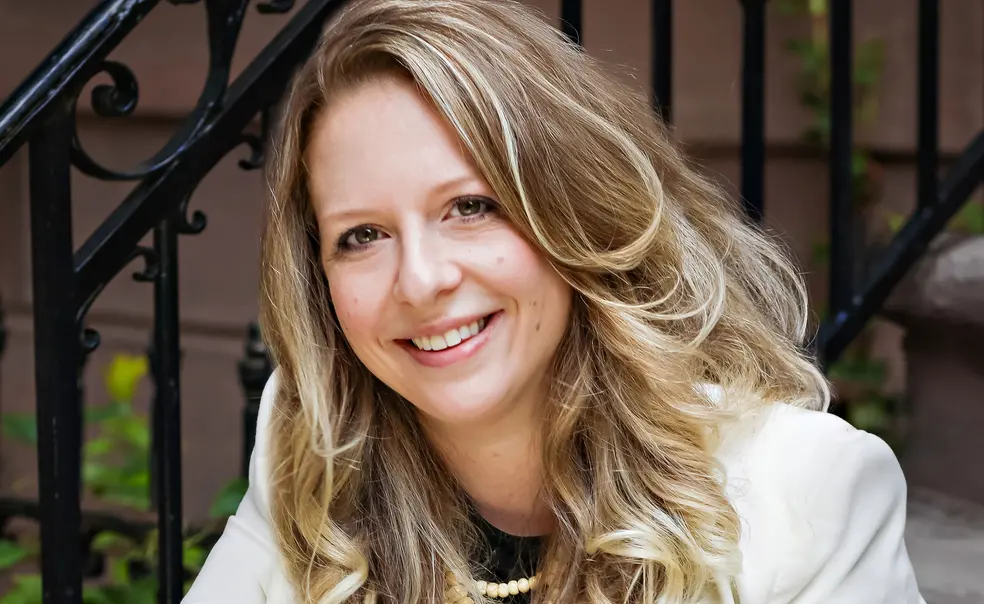Daria Lavelle ’09’s Novel Explores the Relationship Between Grief and Food
The book: After Konstantin Duhovny’s father died when he was 10, he discovered he had an odd gift: he could taste the favorite foods of the ghosts around him. For decades he kept this a secret, until he decided to use his talents for good. Kostya decides to reunite people with their deceased loved ones by preparing a dish for them to share in New York as a way to offer families closure. Aftertaste (Simon & Schuster) covers themes of romance, love and loss, and the grieving process through the shared human experience of food.

The author: Daria Lavelle ’09 earned degrees in writing from Princeton and Sarah Larence College. She is a fiction writer whose work explores themes of identity and belonging through magic and the uncanny. Her short stories have appeared in The Deadlands and Dread Machine among other publications. She lives in New Jersey with her husband, children, and goldendoodle.
Excerpt:
BITTER
THE FIRST TIME Konstantin Duhovny tasted something he hadn’t actually eaten he was 11, seated on the edge of the public pool in Brighton Beach, his heels churning grey water into foam.
He was watching the backs of the other boys — the ones he was supposed to be swimming with, but who never invited him, even out of politeness, into their circle — as they splashed about, showing off handstands and lung capacities, spouting chlorinated water a foot into the air like porpoises.
He watched them all afternoon — Mitya and Sasha and Misha K. and Misha B. (whom they kept calling Bear because of the thick, black hair up and down his back) — until, one by one, their fathers finished their waterlogged Russkaya Reklamas, scratched their nipples through threadbare white undershirts, and peeled their pasty bodies from the rubber loungers, signaling quitting time.
Kostya had come chaperoned by his cousin Valerik — not his real cousin, but the teenage son of Tetya Natasha, not his real aunt but an acquaintance of his mother’s — who had promptly dumped him when his girlfriend whispered something about a kissing booth at the boardwalk nearby.
Don’t you move, Valerik had hissed at Kostya. I’ll be back. That had been two hours ago.
As the last boy, Mitya, raised the handle of the chain-link fence, Kostya felt himself blister with jealousy. There was no one to ferry him home, just like there had been no one to slather sunblock onto his back — which he could already feel was red and tight and burnt — and just like there would be no one to teach him how to talk to these boys in a way that made it clear that he was one of them.
But then, of course, he wasn’t one of them. Their fathers were alive. He kicked faster at the water, kicked violently, kicked at the fathers and sons, kicked at the great cavity of longing inside himself, this way of missing someone, missing them desperately, missing every part including those he’d never known, a pocket so deep he thought that if he could only reach inside of it, worry its lining long enough, break through it to the other side, to where empty could grow full as a belly round with food, he might just find what he was looking for.
Right then, something traveled across his tongue, and Kostya stopped kicking. It coated the inside of his mouth, thick as paste, the taste — the uneaten taste — overpowering. It was savory, salty, the texture mealy, slightly sweet and fatty, something tart, barely, and then, at the tail, in the back of his throat, bitter, bitter, blooming like a bruise. Good, but also bad, just a little bit like shit. He wondered briefly whether one of the boys had found a way to make him ingest a turd — it seemed the sort of thing that boys with fathers could do to a boy without one — but just as quickly, the sensation vanished. Kostya smacked his lips, trying to call it back, but there was nothing left now, only a warmth spreading slowly across his tongue as he choked back tears.
It was only in the absence of the taste that he suddenly recognized what it had been.
Chicken liver, sautéed onions, fresh dill garnish, squeeze of lemon.
Pechonka.
His father’s favorite dish, according to his mother, who invoked it infrequently and had stopped making it after he died. Kostya had never tasted pechonka. He just knew, like an instinct, like another sense he’d only now become conscious of, that the ghost of that dish — not its taste, but its aftertaste — had just been inside of his mouth, spirited there by the person
who most longed to taste it again.
SOUR
YEARS TRICKLED BY, his life fermenting.
He was 15, walking home. Fat textbooks slung across his shoulder, pounding into his hip. His stomach clenched and unclenched, a fist. Empty.
His mom had blown the grocery money, traded their neighbor the food stamps Kostya had painstakingly applied for — hours of bureaucratic paperwork — in exchange for six cartons of Virginia Slims. He should have smoked them himself out of spite, or resold them cheap in the school parking lot, but he didn’t like the taste, and didn’t need any more help becoming a social pariah, thank you very much.
His abdomen moaned as he passed the Russian store — the smell of Rizhsky rye and loops of dry salami such exquisite torture — and the McDonald’s — oh God, fries — and stopped at a traffic light on the corner, beneath the awning for the Olympia Greek Diner.
Kostya peered inside long enough to confirm that it was busy, most of the tables occupied, waitresses whizzing in and out of the kitchen. He pushed through the door and beelined to the coffee station, a table between the bar and bathroom that housed pots of coffee and sugar and sweetener and single-serve pods of half-and-half.
He shoved the creamers into his bag, followed by Dominos packets, and — his lucky day — a stack of individually wrapped saltines. Breakfast of Champions.
When he got home, he was so hungry that he dumped it all into a mug, mashed the saltines and sugar and creamer together before he realized that — no! no! — the half-and-halfs had turned.
He stared at the concoction, at the white chunks dotting the crackers, at the thin, sour whey pooling in the bottom of the glass. He was so hungry he ate it anyway.
He was 18. An adult, technically. He had a job, stocking shelves in a bodega. Had a license, though there was no car to speak of. He could buy porn and fight a war and sign a lease if he wanted. But he still missed his dad like a little kid.
Kostya had always assumed it would get better, but it only got different. His pangs of loss had receded into a numb, ever-present ache, yet every new experience — each minor tragedy or major milestone he wished he could share with his father — soured him, made him feel as if his dad had just died, was dying all over again, like he always would be.
When the kids from school fucked with him at that party, it happened. When he had to convince the social worker that his mom was fine, it happened. When he walked across the stage at graduation, the superintendent mispronouncing his name, it happened. When he had his first drink, cashed his first paycheck, first kissed a girl, it happened. When he nursed his first heartbreak, his first hangover, his string of rejections from colleges and jobs and relationships, it happened, and happened, and happened again.
But that afternoon, when Kostya opened the door to find their landlord, to learn that he had sold their apartment — the last place Kostya had seen his dad alive, had heard his voice, had hugged him—sold it to some new guy who was raising the rent so high they couldn’t possibly stay, Kostya had wept, wept unabashedly, ugly-cried. The landlord apologized, said it was nothing personal, said his dad had been a good guy, reminded him of his own father. Kostya had been about to tell him where to shove his platitudes when he felt the puff of air, the flavor materializing in his mouth — delicate flakes of frozen limoncello, scraped with a fork, spooned into a hollowed-out rind — and felt, without really knowing how, that the landlord was being sincere. That he really was sorry. That he’d lost someone once and remembered how it ached.
He was 30. Two decades fatherless, peeled back a year at a time, the segments of a lime. He had another job now — two in fact, both of which sucked. A shitty apartment, and a Craigslist roommate who’d become his best friend. A life, or something like one.
But too often, instead of looking forward, Konstantin found himself looking back. To when he was 10, waiting at the kitchen table. Or nine, walking through the neighborhood at dusk, sucking the wet wooden stick of a Popsicle. Eight, holding both his parents’ hands, the thrill in his stomach as they swung him high in the air, Coney Island Cracker Jack lodged in his teeth. Seven, lying on a patch of green grass, his dad picking wild mushrooms, peeling open their caps to show him inside. Six. Six. The one he always came back to.
A Kyiv park, sunlight overhead, a pouch folded from newsprint weighted on his lap. Full of soft, overripe fruit. Sour cherries, their skin so thin, their flesh the bright red of a bleed. “Chereshnya,” Kostya said, placing one into his mouth, the juice squirting down his throat, wonderfully tart. “Nyet.” His father shook his head. Smiled. “Vishnya.”
They came from different trees, he explained. Had different fruit, different pits. His father’s grandmother had grown vishnya in the countryside of Ukraine, the mottled bush spilling fruit everywhere, smearing the ground with red come summer. Konstantin had never met his great-grandmother, couldn’t now that she was dead, but he could almost taste her in this bag, inside each sour cherry.
“One day,” his dad told him, “I’ll take you there. To see her village, her old dacha. To taste fruit from her tree.” He spat a pit into his hand, perfectly beige, sucked clean of flesh. “Kostochka,” he told Kostya, “a cherrystone.”
“Like me.” Kostya had grinned. “Like you,” his dad agreed. “My cherrystone. So much waiting in so small a thing.”
BUT THE PAST his father promised him was gone. His future had soured, its possibilities curdled. Now Kostya kept his secrets, his aftertastes, in the unremarkable present. In a bland, haunted loop. He’d stay that way awhile.
But not forever.
From AFTERTASTE. Copyright © 2025 by Daria Lavelle. Reprinted by permission of Simon & Schuster, LLC.
Reviews:
“Aftertaste is a breathtaking novel. Combining the grit of the restaurant world with the magic of the afterlife, Daria Lavelle perfectly blends unexpected ingredients into a book you’ll want to savor. It’s a story about grief that’s filled with humor, warmth, and astounding creativity, and I already can’t wait to read it again.”— Laura Hankin ’10 author of One-Star Romance
“A haunting evocation of pain and pleasure, and the power of food.” — Nigella Lawson












No responses yet